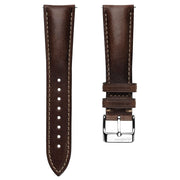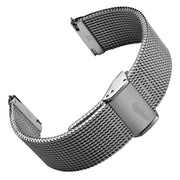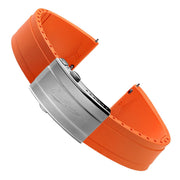Christopher Ward — a brand the folks at WatchGecko know well and work with closely — still gets called a “microbrand” in some corners of the watch world. It’s a label I’ve been hearing for years, and lately, I’ve been thinking a lot about why it persists.
To unpack it, let’s look at three questions:
- A) What is a microbrand?
- B) Why is Christopher Ward absolutely not a microbrand?
- C) Why do so many people still think it is?
Defining a Microbrand
The term “microbrand” is surprisingly vague. It generally refers to a small, independent watch brand selling a relatively low number of watches per year, run by a tight-knit team, without the large-scale advertising presence of mainstream brands. It’s a loose definition — there’s no set sales threshold or headcount — but the spirit of the term is clear: small, niche, and independent.
Christopher Ward no longer fits that description. In fact, they’ve outgrown it by almost every metric.

From Small Startup to Big Numbers
The brand has been around for over 20 years and has seen explosive growth in recent years. In 2019–2020, revenue sat just over £10 million. By 2023–2024, sales had tripled to over £30 million. And in 2024–2025, they leapt again — £45 million in revenue, a 50% increase in just one year. That’s edging toward the top 50 watch brands worldwide by revenue.
They now employ 103 staff, working out of a newly refurbished, purpose-built office. They’ve developed two in-house movements — the SH21, found in the 12X, and the movement in the Loco CW00003. Last year alone, they made £4 million in profit while growing at a pace most brands can only dream of.
And they’re not just making watches — they’re making moves. Christopher Ward sponsors Everton Football Club, a Premier League side, and Charlton Athletic in the Championship. There are even plans for a showroom at Everton’s new stadium. These are big-league partnerships, quite literally.

The Bremont Comparison
Here’s a point of reference: Christopher Ward’s revenue now exceeds that of Bremont, another British brand that started around the same time. Yet no one calls Bremont a microbrand. Why? Likely because Bremont has a visible high street presence through authorised dealers like Goldsmiths and their own mono-brand boutiques. Christopher Ward, by contrast, pioneered an online-first retail model — something that can feel more microbrand-like simply because customers can’t always try before they buy.
That’s slowly changing. Christopher Ward has a showroom in Maidenhead, a presence in the Time+Tide studio in London, a showroom in Dallas, and another U.S. location on the way. But their physical footprint is still small compared to traditional brands, so in retail structure, they do still behave a bit like a microbrand.

Community Power
There’s also the matter of community. Many microbrands thrive because of their direct connection to enthusiasts, and Christopher Ward has always had a passionate fan base. Until recently, they were largely known within that enthusiast circle, and for some, calling them a “microbrand” keeps them feeling more niche and less mainstream.
Other brands with strong communities — Studio Underdog, for example — can also feel “micro” in spirit despite scaling up, simply because their customers are so engaged and loyal.
Room for Improvement
I’m not saying Christopher Ward is perfect. Every time they run a large sale, there seem to be hiccups — items listed that aren’t actually in stock, for example. I’ve seen occasional complaints about customer service. My relationship with the brand is professional, so I can’t speak from personal experience, but at their size now, it’s reasonable to expect high standards of quality control and customer care.
An Open-Door Approach
One thing they’ve always done well — and still do — is keep the lines of communication open. They listen to customers, the community, and even to creators and journalists. In their own words, they “know we’re not perfect, but we are committed to improving every day.” That willingness to engage directly and publicly — to acknowledge shortcomings and work to fix them — is, ironically, one of the most microbrandy traits they still hold onto.
In scale and revenue, they’ve moved far beyond the microbrand category. But in spirit, that open, responsive approach is still part of their DNA.

Is Christopher Ward a Microbrand?
The Verdict
They did £45 million in sales last year. They have over 100 employees. They sponsor a Premier League club. The evidence is clear: Christopher Ward is not a microbrand.
The term might have once fit, but today it sells the brand short. And perhaps that’s the real point — recognising when a label no longer tells the whole story.












